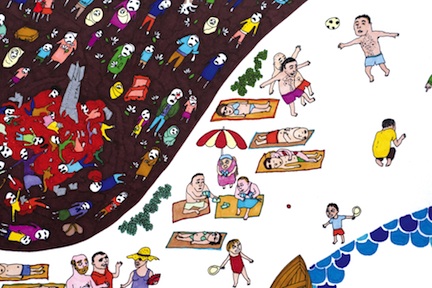
Unburying Our Histories
Alicia Coutts, Coco Riot
A Space Main Gallery
May 31 – July 13, 2013
Essay by: Rachel Gorman
Unburying Our Histories lays bare the devastating intimacy of political violence, and the centrality of its denial to our unequal social and political reality. In works that trace their families’ histories in meticulous detail, Alicia Coutts and Coco Riot have created vivid, trans-generational archives of genocide that confront us with the violence of their disavowal. Coco Riot’s Los Fantasmas (2013) documents the 200,000 civilians killed by fascist troops and buried in mass graves during the Spanish civil war of 1936-1939. Alicia Coutts’s The House in which Florence Sabina Jantina Coutts-Zawadzki Grew Up (2009) takes up the post-war disavowal of Jewish identity, and the intimate enactment of racism within mixed families. Unburying Our Histories turns us toward the affective work of the political. We might think of these apparitions as matter out of place: European hauntings in a middle-class Toronto household; Spanish genocide reproduced on paper and placed on walls. These works prompt us to unbury our dead and acknowledge that their disavowal continues our unequal social and political reality.
Biographies
Toronto artist, Alicia Coutts, received her MFA from NSCAD in 2009. Her work investigates the cultural and psychological identities of people in post conflict societies. Her photographic series, The Lost Synagogues of Poland, documented former synagogues, which are now being utilized for various secular purposes such as swimming pools, movie theaters and mechanic shops. With a deep interest in secret historical spaces, she pursued an Art Conservation post-baccalaureate at SACI University in Florence. Her thesis, The Destruction of Cultural Heritage in a Time of War, examines strategies for the conservation of war affected UNESCO sites. Coutts is the Director of a conservation company dedicated to the preservation of cultural icons.
Born and raised in Southern Spain, Coco Riot grew up surrounded by pencils, comics, and stories of social revolutions. Using drawing, Coco focuses on the visual storytelling of political histories and mythologies through open and playful visual conversations. Coco’s capacity for telling visual stories has been acknowledged by art professionals at an international level. Their art has been shown in contemporary art museums, artist-run centres, political events, and friends’ living rooms. From Toronto to Berlin, from Seoul to Buenos Aires, from New York to their small hometown, Coco’s art has received the support of different artistic and activist communities.
Rachel Gorman is a performance artist working in dance theatre, video, and installation. Since receiving her PhD from the University of Toronto in 2005 with a dissertation on cultural production and class consciousness, Gorman has held a Lectureship at the Women and Gender Studies Institute of the University of Toronto; Research Fellowships at Manchester Metropolitan University and the University at Buffalo (SUNY); and a SSHRC Postdoctoral Fellowship exploring disability politics of Kurdish national liberation struggles. In 2006, Gorman premiered The Ghost, a dance film about Kurdish political prisoners. The Globe and Mail’s Paula Citron called Gorman’s 2002 anti-war production Waking the Living compelling a disturbing and riveting reality check and described her 2004 production Passing Dark as a melancholy journey of intense sadness. Gorman created Transit, a gallery installation on mixed-race identity and political suspicion, in 2007; and combined performance and video to create Pass in 2009 and Fall in 2010.